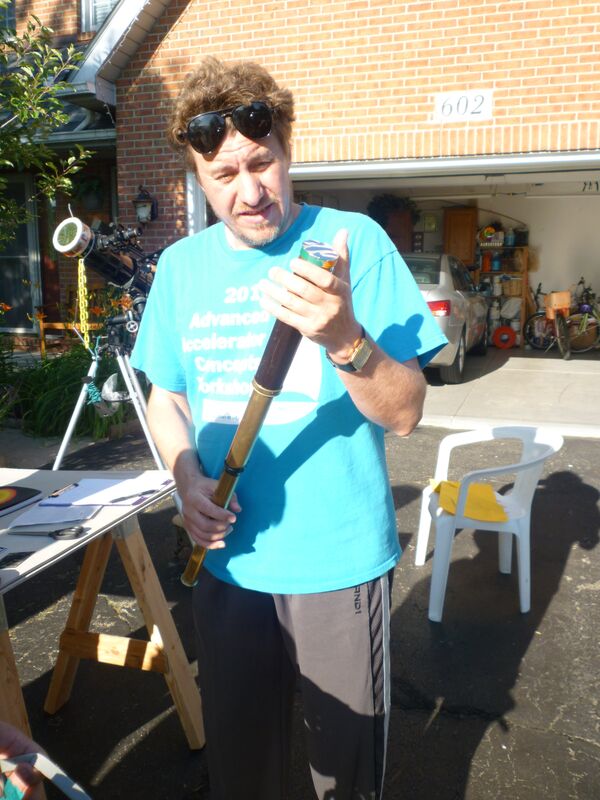WASHINGTON, January 31 (By Carl Schreck for RIA Novosti) – In an academic dustup of astronomical importance, a team of Russian and American scientists have replicated an experiment by 18th-century Russian scientific and literary luminary Mikhail Lomonosov in a quest to demolish skeptics’ doubts that he discovered Venus’ atmosphere.
Using a rudimentary telescope from his St. Petersburg observatory in 1761, Lomonosov claimed to have witnessed evidence of Venus’ atmosphere in the form of a “luminous arc” jutting out from the planet as it made its rare transit between earth and the sun, authors Vladimir Shiltsev, Igor Nesterenko and Randall Rosenfeld note in the February issue of Physics Today.
But some skeptics in the academic community have called into question Lomonosov’s claim, saying he likely saw an illusion due to the primitive telescope he used but claimed it was Venus’ atmosphere because, like his contemporaries, he thought that all planets had atmospheres.
Shiltsev, the Russian-born director of the accelerator physics center at the Fermi National Accelerator Laboratory outside Chicago, said Thursday that he set out to prove that Lomonosov’s discovery was valid because he considered the criticism of the legendary Russian’s research shaky at best.
“It’s not because Lomonosov was Russian,” Shiltsev, 47, told RIA Novosti by telephone. “The biggest driver for me was that I felt pissed off about the unscientific approach to such an important issue.”
Together with his team, Shiltsev scrupulously recreated the conditions of Lomonosov’s discovery—including deploying antique telescopes similar to the 4 1/2-foot (1.37-meter) one used by Lomonosov—to observe Venus’ transit last June.
For Shiltsev, it was a last-in-a-lifetime chance to vindicate the great Russian scientist: The next transits will be in December 2117 and December 2125.
“I don’t expect to live that long,” Shiltsev said Wednesday evening at an awards ceremony in Washington, where he and his colleagues were honored for encouraging US-Russian cooperation in the field of science and education.
The results were a smashing success, according to the research team, whose members are scattered across the United States, Canada and Russia. Using the antique telescopes, two members of the four-man crew observed the same celestial phenomenon that Lomonosov witnessed, the authors write in Physics Today.
A more detailed and technical account of the experiment is slated for publication later this year in Solar System Research, the English-language version of the Russian academic journal “Astronomichesky Vestnik.”
The skeptics remain unconvinced, however.
Jay Pasachoff, a prominent astronomer and a professor at Williams College in Massachusetts, told RIA Novosti in emailed comments Thursday that while Lomonosov was a “great scientist” who correctly predicted what Venus’ atmosphere would do to sunlight, “there is no evidence that he actually saw the atmosphere.”
“He was expecting an atmosphere, he saw something strange, and he said that it was the atmosphere,” said Pasachoff, who has sparred with Shiltsev on the issue in the letters pages of academic publications.
Lomonosov’s description of Venus’ atmosphere does not match “what we now know Venus' atmosphere looks like at the beginning and at the end of a transit,” Pasachoff asserted.
“Whether or not he could have seen the atmosphere with his instrument, he apparently did not see it,” Pasachoff added.
Shiltsev accuses Pasachoff and his fellow skeptics of cherry-picking parts of Lomonosov’s research to support their thesis while ignoring evidence that he indeed witnessed Venus’ atmosphere.
They both agree, however, that Lomonosov prepared meticulously to observe firsthand the phenomenon—something Shiltsev says came as a surprise to him.
Lomonosov appears to have been the only one of the 18th-Century observers “to discover the Venusian atmosphere not by accident, but by designing an experimental protocol that made it possible,” Shiltsev and his co-authors conclude in Physics Today.
Until Shiltsev embarked on the replication project, he thought Lomonosov just got lucky.
“I didn’t really understand that it wasn’t by accident,” he said. “It’s an insight into genius.”




